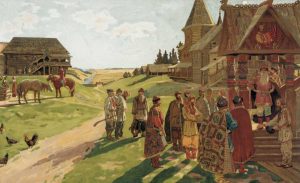"As a result of the Jewish lobby's recommendations, the Young Turks government removed Armenians from Anatolia in...
Ataturk
The narrative of an "enlightened" and generally democratic Turkey, a country that is currently in the process...
In his speech, Mr. Erdogan failed to mention to his audience that the nation he was talking...
In recent years, some strong research has begun to emerge on the genocides against Armenians and Assyrians....
A lot has been written about Nagorno (Mountainous) Karabagh, or Artsakh; people have different opinions of it....
The historian Stefan Ihrig's new book reveals the fascination that Kemal Ataturk, the founder of modern Turkey,...
The Armenian genocide was deliberate action of systematic destruction, executions, dispossession, deportations, forced assimilation, induced famine, ethnic...
Last month, Turkish journalist Uzay Bulut wrote a revealing article, “Turkey Uncensored: A History of Censorship and...
Mr. Shirinian emphasized that the new book Genocide in the Ottoman Empire is the latest tangible effort...











